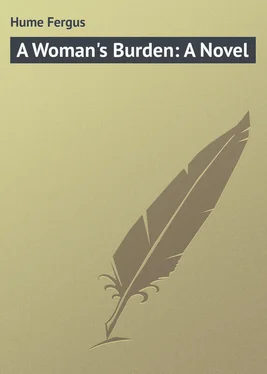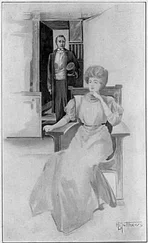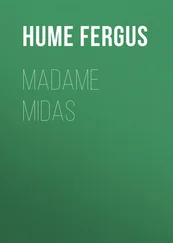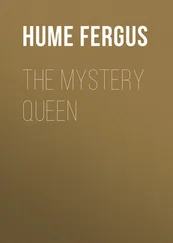Fergus Hume - A Woman's Burden - A Novel
Здесь есть возможность читать онлайн «Fergus Hume - A Woman's Burden - A Novel» — ознакомительный отрывок электронной книги совершенно бесплатно, а после прочтения отрывка купить полную версию. В некоторых случаях можно слушать аудио, скачать через торрент в формате fb2 и присутствует краткое содержание. Издательство: Иностранный паблик, Жанр: foreign_prose, на английском языке. Описание произведения, (предисловие) а так же отзывы посетителей доступны на портале библиотеки ЛибКат.
- Название:A Woman's Burden: A Novel
- Автор:
- Издательство:Иностранный паблик
- Жанр:
- Год:неизвестен
- ISBN:нет данных
- Рейтинг книги:5 / 5. Голосов: 1
-
Избранное:Добавить в избранное
- Отзывы:
-
Ваша оценка:
- 100
- 1
- 2
- 3
- 4
- 5
A Woman's Burden: A Novel: краткое содержание, описание и аннотация
Предлагаем к чтению аннотацию, описание, краткое содержание или предисловие (зависит от того, что написал сам автор книги «A Woman's Burden: A Novel»). Если вы не нашли необходимую информацию о книге — напишите в комментариях, мы постараемся отыскать её.
A Woman's Burden: A Novel — читать онлайн ознакомительный отрывок
Ниже представлен текст книги, разбитый по страницам. Система сохранения места последней прочитанной страницы, позволяет с удобством читать онлайн бесплатно книгу «A Woman's Burden: A Novel», без необходимости каждый раз заново искать на чём Вы остановились. Поставьте закладку, и сможете в любой момент перейти на страницу, на которой закончили чтение.
Интервал:
Закладка:
"Hullo!" cried a fresh young voice, "run hard – hard – for your life!"
A man jumped over the hedge, and flourishing a stick, got between the pursuer and pursued. As he passed Miriam, he tore the loose cape she wore from her shoulders, and threw it at the infuriated animal as he came lunging along head downward. It caught on his horns, fell over his eyes, and the next moment, quite blinded, he stumbled on his knees. The man caught up with Miriam, and putting his arm round her, half pushed, half carried her to the stile. In a minute the three were over it and in safety, while the bull, having freed his head from the shawl, stood looking at his escaped victims and bellowing his disappointment. It was a dishevelled trio which dropped down on the grass beside the stile, out of breath, and with violently beating hearts.
"Thank God!" gasped Miriam, taking Dicky on her lap to soothe him.
"You have lost your cape though," said their preserver.
"Better than losing my life. I have to thank you for that. Hush, Dicky," and she calmed the nervous child.
"I think you did most of the saving," said the young man admiringly. "I came in at the finish, so I must decline the glory. I never saw a neater and pluckier thing."
"Oh, Cousin Gerald," sobbed Dicky, "I'm glad the bull didn't gore you. You were just like a torry-door of Spain. I've seen them in pictures."
"Am I to take that as a compliment, Dicky? What do you say, Miss Crane?"
"Oh, I think it is a very great compliment, Mr. Arkel."
The young man – he was a handsome, fair-haired young fellow in a grey tweed suit – looked at her with a quizzical expression.
"You know my name, and I know yours. I think we can dispense with further formalities under the circumstances – or perhaps you will look after the social observances, Dicky, and introduce me to this lady."
Dicky did so most gravely.
"Miss Crane, this is Uncle Barton's nephew, Cousin Gerald; Cousin Gerald, this is my new governess, Miss Crane."
Gerald Arkel jumped up, swung off his cap, and made a bow. There was a very keen admiration in his eye as he looked at Miriam. Indeed, so marked was his stare that she became a trifle uneasy, the more so when he observed that her face was familiar.
"Surely I have seen you before," he said with a puzzled look.
"Oh, no," Miriam forced herself to say. "I don't think so. Are you staying in Lesser Thorpe?" she asked hurriedly, to divert his attention.
"Yes, with my uncle at the Manor House. He came out with me this morning. I left him fossiking about one of his fences. He'll be here soon."
A chuckle close at hand revealed that Mr. Barton was not only near at hand, but had been close enough to hear the entire conversation. He looked inquisitively from Miriam to his nephew. Gerald took no notice of his scrutiny, but Miriam coloured up, and lifting Dicky from her lap, rose to meet the old man. She led him aside ostensibly to show him the scene of the disaster, but in reality to ask him a question.
"Why do you look at me so, Mr. Barton? Is that – is that – "
"Yes!" Mr. Barton chuckled in his hateful manner. "Yes, that is the man – now you know."
CHAPTER III.
POVERTY HALL
What Miriam meant by her mysterious question, and what Mr. Barton meant by his mysterious answer, was known only to themselves. They seemed to understand one another without recourse to words for the situation – whatever the situation might be – adjusted itself between them on a swift interchange of glances. Mr. Barton was regarded by the parish at large as being as deep as a well; had the parish seen him with Mrs. Darrow's governess at the moment, it might have considered him even deeper. But the young man whom these glances mostly concerned, saw nothing of the by-play which was to influence his future. He chatted with Dicky, and commended him for his prowess in having run into the meadow to reconnoitre the whereabouts of the bull. Gerald knew better than to scold the boy for his folly; he knew what a sensitive, nervous child Dicky was, and chose this way of soothing him by applauding what he knew had been his intention, so that the little lad plucked up his courage, and recovered his nerve – so far as his feeble body could do so. Poor Dicky, he had a weak heart, overstrung nerves, and an injudicious mother; and between them, was fast being ruined body and soul, when Miriam came to save him. But for that strange meeting on Waterloo Bridge, Dicky's chances of life would not have been what they were. But then that same meeting is responsible for so much of moment, as will be seen hereafter – and all because Mr. Barton took one turning instead of another, and so lost himself in a fog. If ever Providence worked to great ends by small means, it was when Mr. Richard Barton, Squire of Lesser Thorpe, was made to mistake Waterloo Bridge for the Bridge of Westminster.
"I am so glad you are here again, Cousin Gerald," said Dicky, patting the young man's slim hand. "You'll tell me stories, won't you, and play cricket with me, and I've got such a jolly governess," finished Dicky incoherently.
Gerald laughed in his pleasant fashion.
"I'll tell you any amount of stories, and I'll play cricket, and I'll adore your governess, Dicky."
"Oh, you mustn't. Hilda will be so angry."
With his usual precocity, Dicky saw more than he was meant to see, and said more than he should have said. Gerald flushed somewhat, and picking up the boy placed him on his shoulder.
"You talk too much, young man," said he gaily. "Miss Crane," with an anxious look lest she should have overheard Dicky's indiscretion, "shall I carry this rascal home for you?"
"Isn't he too heavy, Mr. Arkel?"
"Heavy?" The echo came from Barton. "Why, Gerald is a champion athlete, and plays with cannonballs like feathers. He is Apollo and Hercules both in one."
"At present he is Mercury carrying a soul to the Elysian fields," cried Gerald, and strode off with Dicky, who was delighted with this classical allusion which, from that reading which Miriam so deplored, he was quite able to appreciate.
"I am Achilles! I am Ulysses!" shouted Dicky in ecstasy. "Hermes takes me to Pluto and Queen Persephone. Ai! Ai! Ai!" and Dicky lamented in classical style.
Barton looked after the pair.
"You ought to be satisfied," said he to Miriam. "He is a handsome fellow, though he is a fool."
"He neither looks like a fool, nor talks like one, Mr. Barton."
What reply the cynic would have made to this curt contradiction it is impossible to say; but at that moment a shadow fell on the grass near them. Only the shadow – the shadow of a man; yet Barton whipped round with the sudden snarl of a startled wild beast. His snarl was even more hateful than his chuckle, and Miriam winced as she also turned to see the substance of the shadow. Even now, well-nourished, rested, and having recovered her nerve, as she had, she still dreaded Barton. There was something so uncanny about him – something akin to the satyr – to Pan, the inspirer of causeless terrors – that she could never overcome a creeping of the flesh, a sinking of the heart when in his presence. Mr. Hyde, of fictitious fame, was not more hateful.
The new-comer was a tall lean man, so tall, so lean, that he might be defined in the terms of Euclid as a line, having length without breadth. His legs were long, his arms were long, even his head was long; and clothed in a suit of solemn black, which reflected no lustre, he came as a blot on the sunny landscape. His eyes were small and close together; they looked everywhere but at the person he was addressing, past you, about you, but never by any chance at you; and – as Miriam heard, not then, but long afterwards – he had a deep, booming, cracked voice, such as might come from a flawed and rusty bell. She did not know the man at the time; she had cause to know him later; and he always appeared in the same noiseless, stealthy, slinking way. If Barton was a rat, this man was akin to the serpent.
Читать дальшеИнтервал:
Закладка:
Похожие книги на «A Woman's Burden: A Novel»
Представляем Вашему вниманию похожие книги на «A Woman's Burden: A Novel» списком для выбора. Мы отобрали схожую по названию и смыслу литературу в надежде предоставить читателям больше вариантов отыскать новые, интересные, ещё непрочитанные произведения.
Обсуждение, отзывы о книге «A Woman's Burden: A Novel» и просто собственные мнения читателей. Оставьте ваши комментарии, напишите, что Вы думаете о произведении, его смысле или главных героях. Укажите что конкретно понравилось, а что нет, и почему Вы так считаете.












